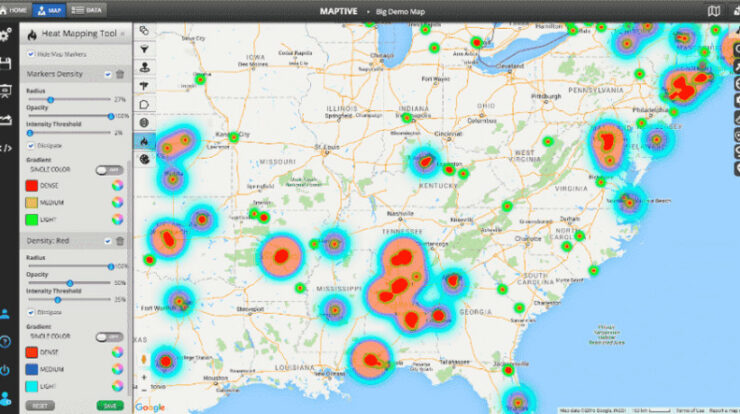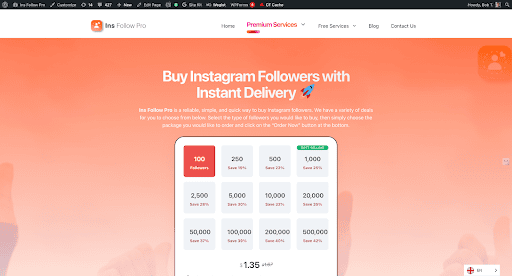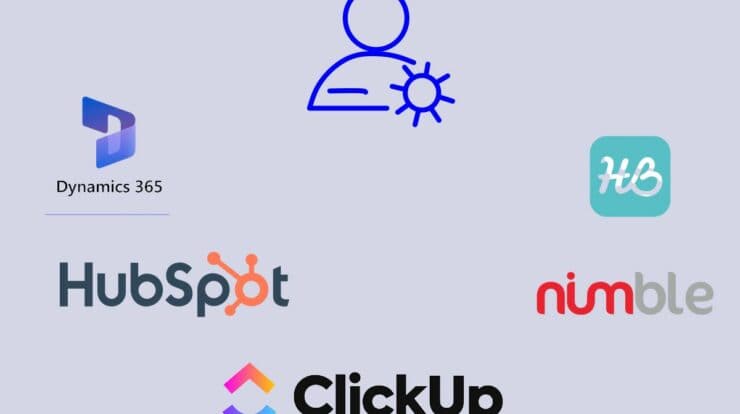
While sales are only one aspect of your business, it’s a dynamic and critical component. Data is the first point of reference if you’re looking to increase productivity and develop a more productive sales team. As leads continue to pop up throughout the time, sales figures and quotas need processing.
The company data can give sales teams the proper direction to increase predictability and consistency to boost sales. Mapping software provides a business with a competitive advantage that doesn’t show within spreadsheets. Studies show that sales increase up to 7% when optimizing the territory design, noticing a 10-20% increase in productivity. Using mapping software directly connects with the rise in sales performance, highlighting key demographics that are hard to see without adequate visualization.
To help you choose the best mapping software for your business, here are a few programs to get started:
Spotio
This mapping software is the perfect combination of field service management and sales engagement software. The software focuses on bringing unique visualization to your business, regardless of industry. Ideal industries include marketing, real estate, insurance, pharmaceuticals, and food. Organizations can also manage operations on a centralized platform, particularly with route optimization, lead visit tracking, and communications.
Spotio allows field employees to store visit details, email communications, SMS messages, and client calls. Management can optimize the autoplay functionality and daily task sequences to organize leads. Team members can generate leads, filter prospects, schedule appointments, and track different lead statuses as sales prospects. Administrators can configure different role-based permission rights and manage opportunities based on territories. Prices start from $39 a month, with monthly subscriptions available.
Maptive
Mapping software provides businesses of all sizes with geospatial analysis and data visualization capacity. Maptive is cloud-based mapping software that incorporates custom mapping functionality for personalized data. This software integrates Google Maps to create a highly customized solution for those wanting to understand user data better.
Users directly upload location data from CRM or spreadsheet platforms, applying various features to create custom maps quickly. Mapping options include heat maps, territory mapping, demographics, and route optimization. This software is ideal for management wanting to develop competitive analysis, incorporate new territory development, or target underdeveloped areas.
Intuitive and Influential Design
Maptive proves GIS mapping software isn’t naturally complicated. The application uses robust analysis, so no coding is required. The cloud and web-based solutions bring true accessibility with many updated features. Users can access the software from any tablet, mobile, or desktop application. Users can easily import content from files into an accessible mapping application.
Extensive Range of Customizations
The custom map maker offers unlimited options for personalizing your map and creating beautiful data visualizations. These maps work for internal analysis, websites, public sharing, or presentations. These features include branded images, custom marker size and color, default zoom selection, and improved share functionality.
Final Feedback
With complete customization and accessibility, Maptive integrates critical components into your business that other companies struggle to maintain. The global coverage and world-class tools offer unmatched performance. With the 10-day trial, users can develop a solid software understanding without investing a fortune into a program that doesn’t work well for their organization.
Google Maps Software
This mapping software is one of the more straightforward applications, especially with free access. It offers a comprehensive service, optimal for simple routes and development. Functionally, Google Maps offers many components, including the favorite places option. This section includes local hotspots or additional areas that are visited regularly. It’s essential to understand the limitations of this software, as Google Maps pushes a maximum of ten locations on the same map. For larger businesses requiring multiple stops, these limitations may prove frustrating.
It’s also important to recognize that Google Maps does not offer route optimization at this time. Any destinations entered into the software will optimize according to the order but not among different stops. Users will need to individually enter each visit into the map to determine the optimal order. Google Maps brings functionality and mapping integration into core businesses as core software, but the overall capabilities are significantly limited.
eSpatial Mapping Software
This cloud-based mapping software is engineered for businesses and enterprises wanting to succeed. eSpatial believes mapping should be easy, powerful, and fast. Users can upload, visualize, and analyze multiple layers of data using rapid visualization that relieves guesswork of decision making. Whether Fortune 500 company or a non-profit organization, eSpatial works to connect users with their mapping goals.
This software offers a comprehensive set of features that enable users to visualize, interpret, and analyze business data currently stored in spreadsheets, presenting the contents on an easily readable map. Visualization allows management from all departments a clear representation of stats, combined with effortless integration.
What Features to Consider with Mapping Software
The features of your mapping software are a crucial consideration when deciding. While some corporations may thrive with intuitive and straightforward software, others likely want more from their analysis. If you’re looking for key features, here are a few components to look for:
A Heat Mapping Tool
Identify where your sales are coming from and areas that need improvement with heat mapping functionality. Users can quickly gain insights into underperforming areas, recognize sales density, and highlight which salespeople need further support and attention.
Route Optimization Tools
Knowing how to optimize your different routes can differentiate between increasing your sales and wasting resources. Route optimization helps improve core functioning, which increases revenue.
Filter Functionality
Most businesses have a lot of data on their customers, which is challenging to navigate. Using the filter function on a geospatial map can improve understanding, highlighting critical information.
Conclusion
Mapping software better understands the modern market, integrating consumer information into the geospatial realm. Users can focus on select components, better understand their own business, or target new markets efficiently without wasting valuable resources. Whether you’re a small business or large enterprise, mapping software is essential for pushing the boundaries of your current consumer analysis.


